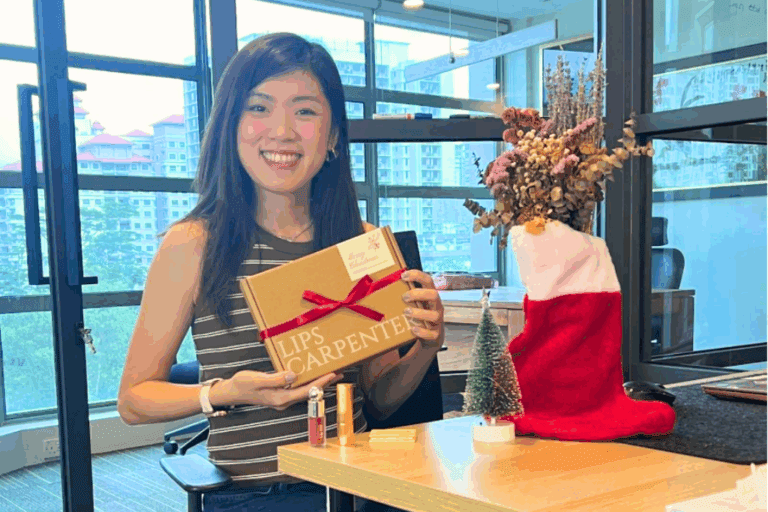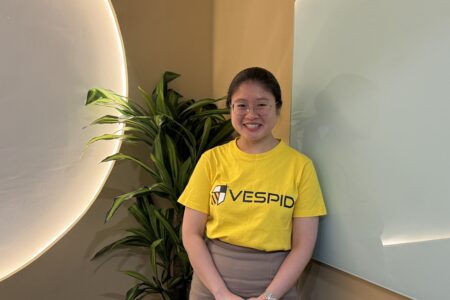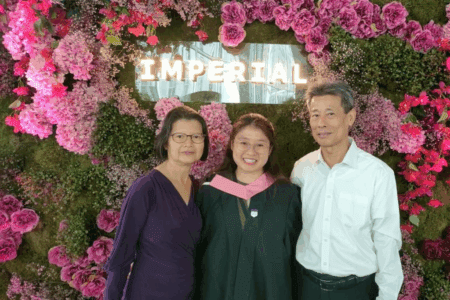
Yifon Law’s life looked perfect on paper — the kind that makes parents beam with pride. Full scholarship to the American University Programme at INTI International University. Transfer to the University of Michigan in 2010. Degree in actuarial mathematics and economics by 2013. A coveted position at Deloitte as a Human Capital Analyst. She had picked actuarial science because it seemed to strike that elusive balance: challenging enough for her math-sharp mind, but with room to breathe creatively.
Everything was unfolding exactly as planned.
But then, she decided to change up the narrative. After two years in the US, Law packed up and moved back to Malaysia, trading Deloitte’s global prestige for a boutique consulting firm in KL. Then, five years into her actuarial career, one that many peers might vie for, Law took a sabbatical from the corporate ladder she’d spent years climbing.
During that break from spreadsheets and risk assessments, Law founded Lips Carpenter, transforming from number-cruncher to entrepreneur with her own lip care brand.

Law graduated in 2013 with a Bachelor of Science in Actuarial Mathematics and Economics. Source: Yifon Law
Why did the international student move back to Malaysia?
Working at Deloitte is certainly no small feat. After all, Deloitte is considered one of the Big Four professional services networks in the world, known for their dominance in audit, tax, and consulting services.
For international students such as Malaysians, working in the US is also a big deal due to the American currency being much stronger. Plus, she had secured a H-1B visa, and could have been on track to getting permanent residence.
Why would anyone leave that behind?
Turns out, there are many good reasons why.
“A big part of it was family,” she says. “At the same time, working in the States, especially in big and mature conglomerates, although you can get a lot of exposure, what you do has less impact on the firm.”
Such is true for most big corporations. Individuals may often feel like just a cog in the machine — replaceable or sometimes even disposable.
“I wanted to do something where my presence felt much more significant,” she says.
And in Malaysia, she felt that way. She felt like she actually got more exposure to challenges, making her more resourceful. Most major companies in the US are already so well established, but many firms in Malaysia are still developing, which means employees have more say in steering the direction and building the corporate culture from the ground up.

Team members of Lips Carpenter posing with their products. Source: Yifon Law
Starting her own business to contribute to more planet-friendly lips
Studying in Michigan, Law saw a lot more diversity in not just backgrounds but also ways of thinking. This experience allowed her to broaden her perspective of the world and her role in it.
“The diversity in the States also kept reminding me about inclusivity,” she says. “Eventually you embrace a lot more about who you are.”
With that, Law began to nurture this sense of doing more for her own community. That was part of the reason why she came back to Malaysia and started Lips Carpenter.
In 2018, Law founded Lips Carpenter with her sister, Yi-Xian. The idea was to create a more planet-friendly product that was also kind to the skin, too. They also offer name engraving services, making their products perfect as gifts.
The thing with clean products, though, is that sometimes they lack efficacy. Lips Carpenter sought to create sustainable products that actually worked, providing a truly usable alternative to conventional lip products.
“If we are able to do something different for the community around us, for the community who raised us, it gives more meaning and purpose to me as an individual,” Law says.
How her American education influenced her entrepreneurship
Focused on building and growing Lips Carpenter, Law is no longer a practising actuarial professional.
Still, her education, especially her time spent abroad, has left her with innumerable lessons and insights into life.
A lot of people see switching careers as requiring a big leap of faith, especially if they studied something else in university. To Law, completing a degree takes three to four years. But those years don’t just teach you academics — it shows how repeated exposure to certain things and skills helps you master something.
The same goes for entrepreneurship. After repeated exposure, you will eventually pick up the know-how and confidence to steward a business.
“Studying abroad gives you a lot of different values and perspectives that you may not be able to get if you are within your comfort zone,” she adds. “Not to say that you have to go abroad to do that. But when you’re being put in a new environment, you just need to survive and adapt, and sometimes, these adaptations can be tremendous. And that makes you grow more.”
Decisions, there will be many, from figuring out how to survive on a weaker currency daily to making sense of a whole new vocabulary.
“It shaped how I think and make decisions as well,” she says. “It also taught me a lot about empathy. It was a lot of embracing who other people are, and who I am as well.”










